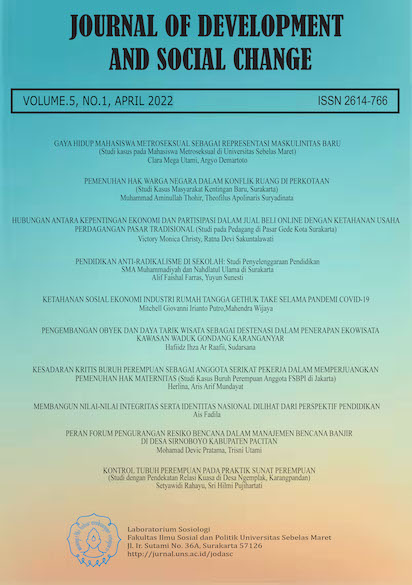Pemenuhan Hak Kesehatan Reproduksi: Kajian Pengalaman Pekerja Perempuan di Perusahaan Tekstil dan Garmen di Sukoharjo
Abstract
Reproductive health rights are among the rights of women guaranteed by the government through laws and various other regulations, including reproductive health rights for female workers. Specifically, regulations regarding the fulfillment of reproductive health rights for female workers are written in Law Number 13 of 2003, Ministry of Health Regulation Number 15 of 2013, Ministry of Manpower Regulation No. 03/Men/1989, and CEDAW Article 11 Paragraph 1. The purpose of this research is to understand the experiences of female workers in exercising their reproductive health rights and to determine whether discrimination against female workers is still present. This study employs the Harvard Gender Analysis framework, hoping this theory can assist the author in analyzing the ease with which female workers access their reproductive health rights. The research method used is qualitative, involving in-depth interviews and observations within textile and garment companies located in Sukoharjo, using a case study approach. The results of this study indicate that, broadly speaking, female workers in textile and garment companies in Sukoharjo can easily access reproductive health rights. However, there are still some reproductive health rights that companies have not fulfilled, such as the right to menstrual leave on the second day and working hours rights.
Keywords: reproductive health, female workers, discrimination, harvard
Full Text:
PDFReferences
Adianto, J., Muhammad, F. 2018. Peningkatan Kualitas Tenaga Kerja Dalam Menghadapi ASEAN Economy Community. Jurnal Pekerja Sosial, Vol. 1, No. 2, pp 78-79.
Alfatika, M., Saddam, B., & Reza, F. 2023. Partisipasi Perempuan dalam Perencanaan Pembangunan Desa Lon Asan Kecamatan Lembah Seulawah Kabupaten Aceh Besar. Jurnal Ilmiah Mahasiswa FISIP USK. Vol, 8. No. 4, pp. 5.
Badan Pusat Statistik. 2023. Direktori Industri Manufaktur Indonesia 2023. https://www.bps.go.id
Halizah, L.R., Ergina, F. 2023. Budaya Patriarki dan Kesetaraan Gender. Universitas Islam Negeri Antasari Banjarmasin. Vol. 11, No. 1, pp 21.
Murdiyanto, E. 2020. Metode Penelitian Kualitatif (Teori dan Aplikasi disertai Contoh Proposal). Lembaga Penelitian dan Pengabdian Kepada Masyaraakat (LP2M) Universitas Pembangunan Nasional “Veteran” Yogyakarta Press 2020, pp. 19.
Ridlo, U. 2023. Metode Penelitian Studi Kasus: Teori dan Praktik. Publica Indonesia Utama Anggota IKAPI DKI Jakarta. Perpustakaan Nasional RI.
Satu Data Kota Bima. 2022. Jumlah Pekerja Perempuan pada Lembaga Pemerintah dan Non Pemerintah di Kota Bima, di rinci per Kecamatan Tahun 2021. https://data.bimakota.go.id/dataset/jumlah-pekerja-perempuan-pada-lembaga-pemerintah-dan-non-pemerintah-di-kota-bima/resource-1
uks.kemendikbud.go.id. 2022. Pendidikan Kesehatan Reproduksi. https://uks.kemdikbud.go.id/program/pendidikan-kesehatan-reproduksi
Undang-Undang
CEDAW Pasal 11 Ayat 1 Huruf F
Peraturan Menteri Kesehatan Nomor 15 Tahun 2013
Peraturan Menteri Tenaga Kerja No 03/Men/1989
Undang-Undang Nomor 13 Tahun 2003 Pasal 76
Undang-Undang Nomor 13 Tahun 2003 Pasal 81
Undang-Undang Nomor 13 Tahun 2003 Pasal 82
Undang-Undang Nomor 13 Tahun 2003 Pasal 83
Undang-Undang Nomor 13 Tahun 2003 Pasal 86
Undang-Undang Nomor 13 Tahun 2003 Pasal 93
DOI: https://doi.org/10.20961/jodasc.v7i1.89681
Refbacks
- There are currently no refbacks.

This work is licensed under a Creative Commons Attribution-ShareAlike 4.0 International License.




